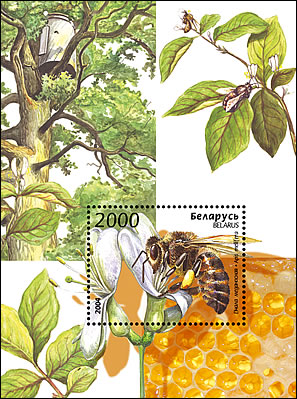Biologists at the University of California at San Diego (UCSD) have discovered that a small dose of the commonly used neonicotinoid crop pesticide imidacloprid turns honey bees into “picky eaters” and affects their ability to recruit their nestmates to otherwise good sources of food. The results of the experiments, detailed in this week’s issue of the Journal of Experimental Biology, shed light on one of the main culprits suspected to be behind the recent declines in honeybee colonies and detail the particular ways that the substance impedes the functions of the colony.
A nicotinic acetylcholine receptor agonist, imidacloprid, impairs memory formation in honey bees and has general effects on foraging. However, little is known about how this agonist affects two specific aspects of foraging: sucrose responsiveness (SR) and waggle dancing (which recruits nestmates). Using lab and field experiments, we tested the effect of sublethal doses of imidacloprid on (1) bee SR with the proboscis extension response assay, and (2) free-flying foragers visiting and dancing for a sucrose feeder. Bees that ingested imidacloprid (0.21 or 2.16 ng bee–1) had higher sucrose response thresholds 1 h after treatment. Foragers that ingested imidacloprid also produced significantly fewer waggle dance circuits (10.5- and 4.5-fold fewer for 50% and 30% sucrose solutions, respectively) 24 h after treatment as compared with controls. However, there was no significant effect of imidacloprid on the sucrose concentrations that foragers collected at a feeder 24 h after treatment. Thus, imidacloprid temporarily increased the minimum sucrose concentration that foragers would accept (short time scale, 1 h after treatment) and reduced waggle dancing (longer time scale, 24 h after treatment). The effect of time suggests different neurological effects of imidacloprid resulting from the parent compound and its metabolites. Waggle dancing can significantly increase colony food intake, and thus a sublethal dose (0.21 ng bee–1, 24 p.p.b.) of this commonly used pesticide may impair colony fitness.
Sources:
UCSD press release, http://www.beyondpesticides.org
Daren M. Eiri and James C. Nieh. A nicotinic acetylcholine receptor agonist affects honey bee sucrose responsiveness and decreases waggle dancing. doi: 10.1242/jeb.068718 June 15, 2012 J Exp Biol 215, 2022-2029
http://jeb.biologists.org/content/215/12/2022.short

- Log in to post comments
